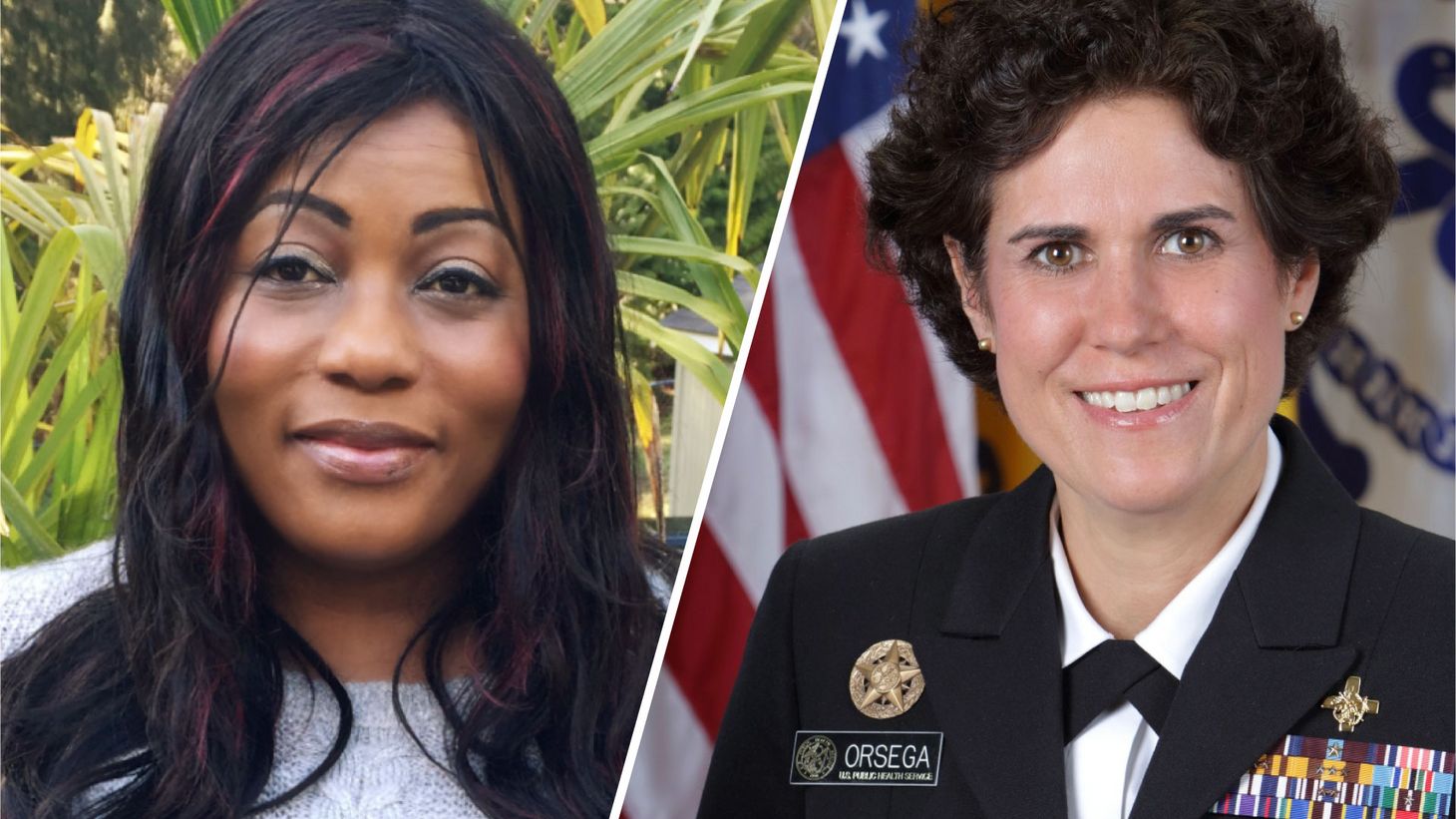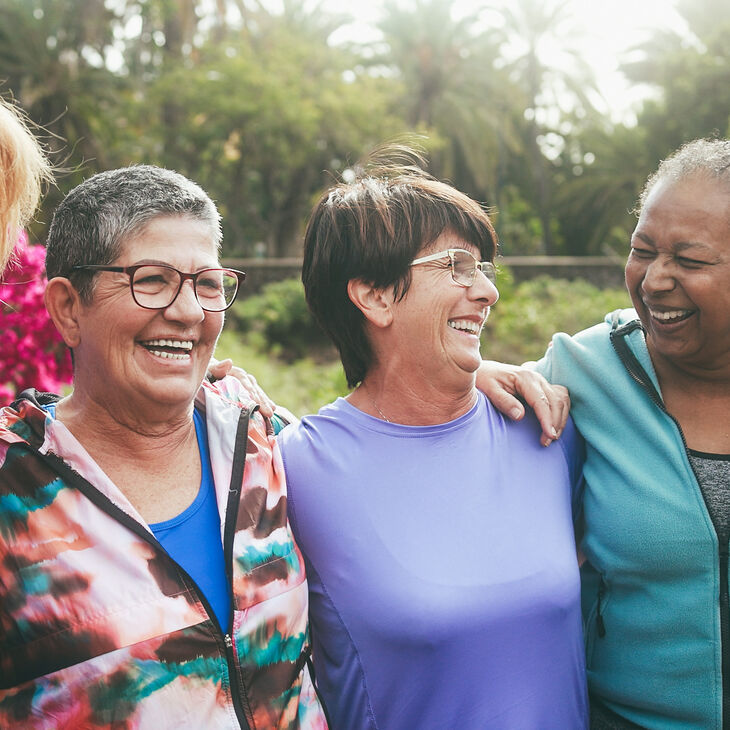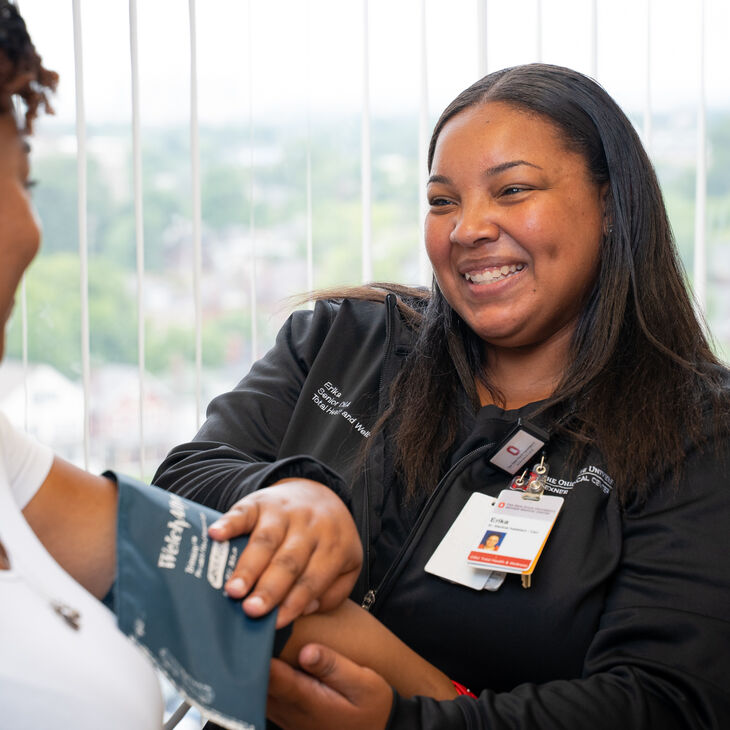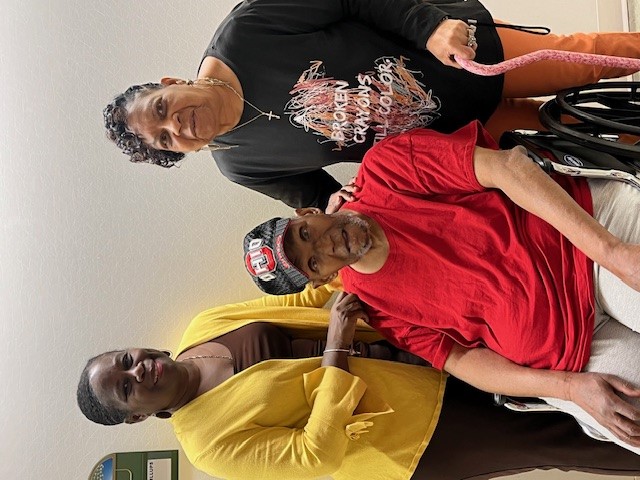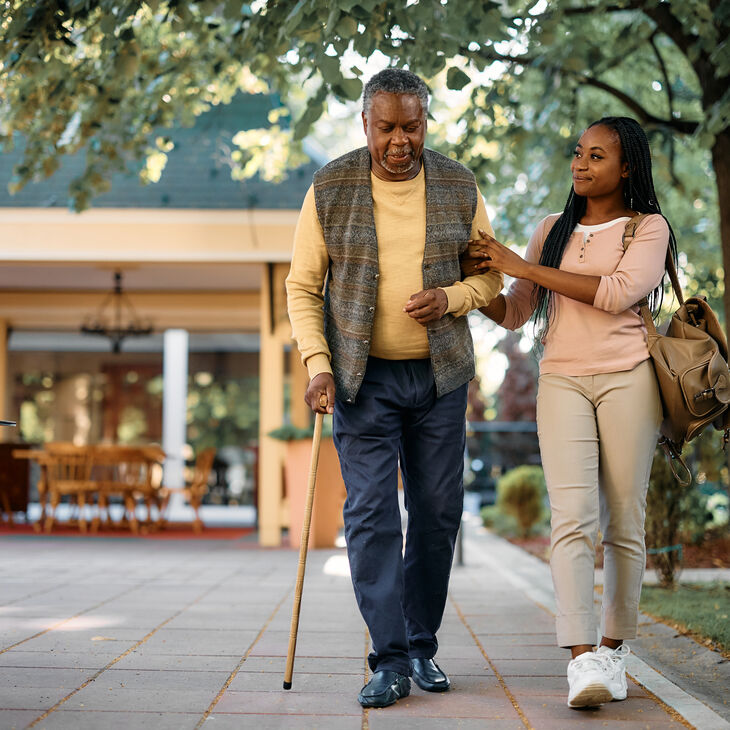A special introduction from Dean Bernadette Melnyk:
One year ago this month, the World Health Organization declared COVID-19 a global pandemic. The pandemic impacted all of us on a personal level, whether it was coping with illness, mourning the loss of family and/or friends or managing the stressors of balancing work with home life and children. I have been very reflective about the challenges we encountered these past 12 months, including the racial and political tensions in our country, as well as the extraordinary courage and selfless caring acts that our nurses, physicians and other healthcare heroes have displayed. We look forward to a brighter future together as we continue to dream, discover and deliver a healthier world for all.
To recognize this one-year milestone and in honor of Women’s History Month, our Transformative Solutions in Healthcare series this month features interviews with two prominent national nurse leaders who have played vital roles in battling the pandemic and advancing policies to bolster our healthcare system. Former American Academy of Nursing CEO Pat Ford-Roegner engaged with Jane Hopkins, RN, who served on the Biden/Harris COVID-19 Transition Advisory Board, and Rear Admiral (RADM) Susan Orsega, MSN, FNP-BC, FAANP, FAAN, who currently serves as Acting Surgeon General of the United States. We thank these two terrific leaders for answering Pat’s questions and sharing their perspectives, hopes and motivational words with us.
Click here to read Jane Hopkins’ interview.
Click here to read RADM Susan Orsega’s interview.
Jane Hopkins interview:
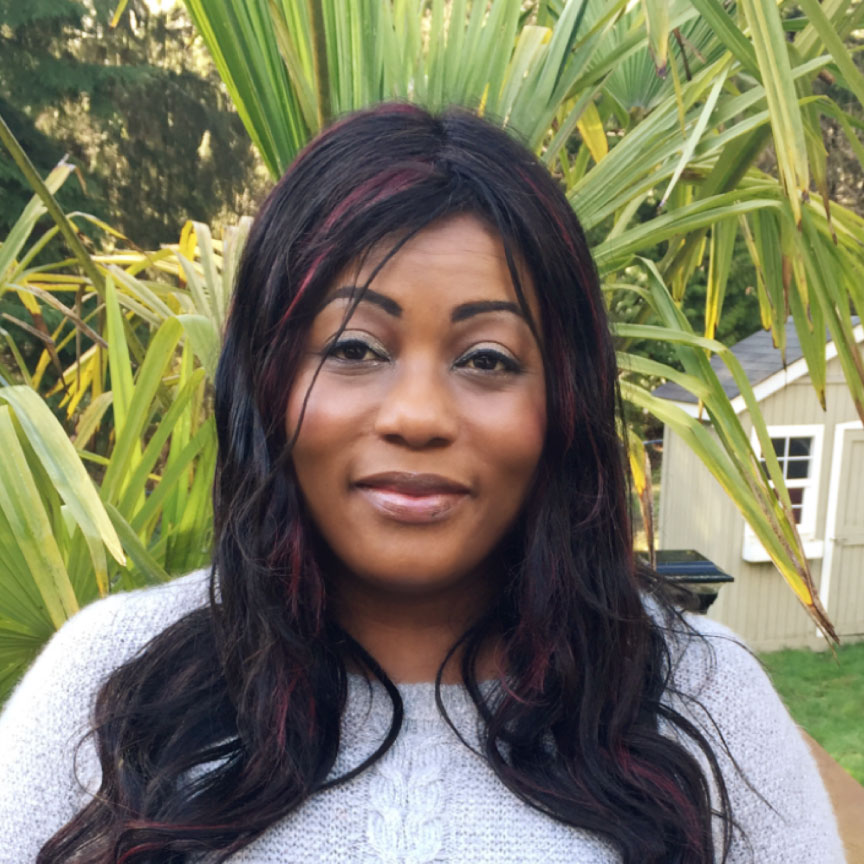
The nursing world is very proud of your engagement as a member of the Biden/Harris COVID-19 Transition Advisory Board. What was the biggest challenge you faced in that role, and how did you work to overcome it?
The biggest challenges were: 1) Many of the board members already had relationships and were on other teams together. As a newcomer to this realm of service, I worried about how I was going to fit into the dynamics of the team. 2) Many of my colleagues on the board were longtime scientists and subject matter experts with lots of experience in the media and government. I was concerned about what I could bring to the table to motivate them to listen to me and take me seriously.
I overcame those challenges by realizing that I was on the board because of my perspective as a front-line worker, a labor union leader, a black woman and an immigrant, and by reminding myself that those experiences constitute a valid expertise. I knew that the people I was representing were those who are often not heard in these spaces and I felt that responsibility deeply. I simply could not afford to be on the sidelines when the safety of healthcare workers was at stake, and I found the courage to follow through and speak up knowing that a community of hardworking people were depending on me.
The team was kind, gracious and welcoming.
How did the COVID-19 Transition Advisory Board impact approaches to both policy and execution in response to the pandemic?
From the start we were given the task of advising the president’s team on what needed to be done to be ready to lead on day one, and I think we achieved our goal. We had many stakeholder meetings and were able to hear from numerous sectors. Now we are seeing the results of our work with the direction that the administration is taking to defeat this virus. I really feel that we had a huge impact on the administration’s policies and priorities, and I’m very proud to have been part of it.
Obviously, you are no stranger to leadership roles and big responsibility. Can you share experiences in your career that prepared you for this important service at this critical time in our nation’s history?
My journey to being on the transition team has been incredible and there are many experiences in my life that prepared me for this role. I am an immigrant from Sierra Leone and spent my teenage years and early adult life in England, and my path to leadership really began when I chose to become a nurse and specialize in behavioral health. When I came to the U.S., I worked in the trauma one center in the WAMI (Washington, Alaska, Montana, Idaho) region where I organized with my co-workers to speak out on safety and other working conditions. I always found immense satisfaction in lifting up and supporting my co-workers. I loved working in the float pool and being a resource when a unit was short-staffed. I learned to recognize, point out and actively work against the injustice all around me, especially when it came to advocating for those who are often ignored by those in power.
It is no surprise that I gravitated to union work and ended up in leadership as the Executive Vice President of SEIU 1199NW, comprised of 32,000 nurses and healthcare workers in Washington State, Alaska and Montana. I approached my work on the board the same way I approach my union work: with a lens of racial and social justice and a tremendous respect for all workers.
You are a role model for nurses seeking appointments on boards and state/national organizations. What skills and/or knowledge would you say are needed the most?
The most important thing is knowing your worth. You are enough and you are an expert when it comes to understanding the needs of the patients and the community. Nurses are widely respected, especially now, when the vitality of our work is on full display. Don’t be afraid to leverage that respect to make sure your voice is heard. Remember that as a nurse you are in tune with the health of your community and you understand the human ramifications of policy in a way that makes you uniquely qualified to be a leader.
The Ohio State University College of Nursing is a national leader in nursing education, innovation and evidence-based practice. What words of wisdom would you share with our students, faculty and staff as they endeavor to transform health and improve lives?
Your job is essential to the wellness of our communities and this country. As students you have so many opportunities in front of you, and possibilities are endless. You can make a difference in any specialty you choose.
For faculty – thank you for the work that you do.
RADM Susan Orsega interview:
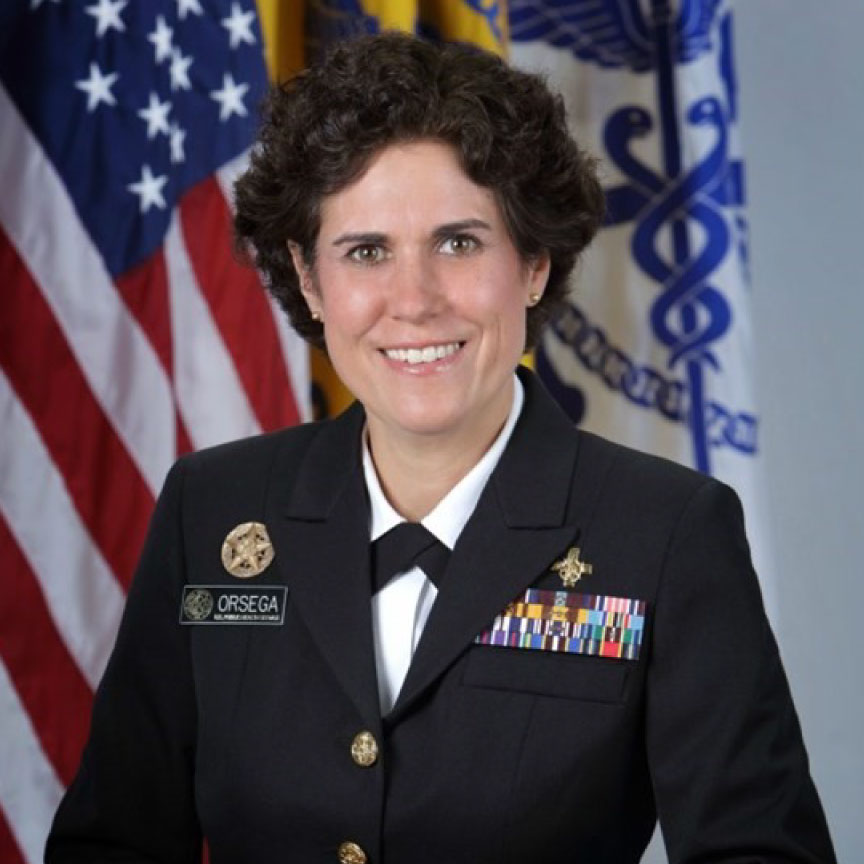 You have enjoyed a career dedicated to public service in healthcare. This past year, obviously, has produced challenges that none of us have ever experienced. How have you approached your service during the pandemic, and what have been the biggest challenges and successes you’ve seen?
You have enjoyed a career dedicated to public service in healthcare. This past year, obviously, has produced challenges that none of us have ever experienced. How have you approached your service during the pandemic, and what have been the biggest challenges and successes you’ve seen?
The biggest challenge I feel each day as a leader is to ensure that I can take in as much of and the best information possible in order to make the most informed decisions. This helps me ensure that I am not making decisions from a reactive posture. As the Acting Surgeon General and Director of Commissioned Corps Headquarters, I am responsible for advancing the health of the American people, leading the U.S. Public Health Service (USPHS) Commissioned Corps and overseeing our response to COVID-19.
COVID-19 has impacted everything in our lives – our health, our work, our play and our relationships. As public health leaders, we have to remain on guard. The importance of our role and advocating for vaccinations can help reduce the burden on the healthcare system as we continue to battle COVID-19. It is incumbent upon us to raise our voices in communities of greatest needs and COVID-19 is the backdrop.
The USPHS Commissioned Corps is a safety net for underserved populations. It is a mobile, duty-bound group of 6,100 uniformed health officers willing to go anywhere, at any time, to meet the nation’s most urgent public health needs. This commitment is even more evident today. As Public Health Service officers and America’s Health Responders, we stand ready to preserve public health and national security during national or global health emergencies. Responding to the COVID-19 pandemic is no different. Our mission is to be out the door as soon as requested, as this response is and continues to be an “all-hands-on-deck” situation for our officers.
To date, more than 4,400 Public Health Service officers have deployed during the COVID-19 pandemic in support of our worldwide efforts, including deploying to the Diamond Princess cruise ship in Japan and repatriating Americans to our military bases. Public Health Service officers have assisted community-based testing sites with testing and providing infection control and clinical care to long-term care facilities, hospitals and field hospitals in hard-hit communities – exemplifying the care and compassion that all of us feel across the Department for those who have suffered during this pandemic.
In a recent interview you commented: "One thing that COVID has made abundantly clear for me is how small our planet is and how interconnected we are and how much we need to work across all the professions to address this complex public health crisis. We have to make sure we do this together in a united way." What infrastructure in our public health system needs to be bolstered to make sure that the next threat can be met in a united way?
What needs to be bolstered are the lines at the state, local and national levels. At the end of the day we need to understand what works in the communities on the ground; when we can do that, we can advance the mission. It is also extremely important for us to continue to strengthen our interdisciplinary infrastructures to help advance our research, science and public health practices. Having worked at NIH in very dynamic and very complex environments, sometimes in countries and communities in crises, I have grown to understand that if you can lead in a purposeful and humble way you can work in any environment. I realize the importance and value of collaboration when it comes to public health and research. Interdisciplinary systems cultivate an inclusive environment where various disciplines come together to solve complex health issues and develop holistic health solutions.
One thing I’ve learned throughout my career is that in order for us to be prepared for any public health threat that we may face, we must continue to work together, share knowledge, and understand the sciences (both social and behavioral) to prepare for any complexities that may come our way.
How have your past assignments – New York after 9/11, other disaster/humanitarian missions worldwide – prepared you to address this unique moment in our history?
I have deployed over 20 times in my career, beginning with Hurricane Marilyn in 1995 and as you mentioned 9/11, to leading international research partnerships with the South African and Malian governments, to playing a fundamental role in the U.S. government’s NIH Ebola response. My work in public health emergency and disaster care experience has helped improve population health and equity worldwide.
Based on all of these experiences, I have approached this moment in history with the same skill, urgency and compassion while remembering that you are a guest / a health diplomat, whether you are working at Indian Health Service reservation or in a school participating in a remote area mission or in Mali. Awareness of local cultural fluency, a competency learned through assignments in the government collaborations, provides opportunities for improving the public health of the individual, their communities and the entire country.
Obviously, serving as Acting Surgeon General of the United States is a big honor that carries with it a big responsibility. What were your central goals serving in this role?
I am humbled to serve in the role as Acting Surgeon General. My vision is to maintain the mission in a united front: Move the USPHS Commissioned Corps forward during this unprecedented time, making sure our officers are safe and deployed with all the resources they need in their hands and remembering the resources they have in their heads.
The USPHS Commissioned Corps continues to serve in a leadership role. We are focused on protecting, promoting and advancing the health of our nation. We need to remain flexible, continuously learning with a forward posture of preparedness and committed to ending this pandemic.
You are a national role model for nurses who are seeking board or state/national appointments. How would you recommend nurses approach securing these kinds of appointments, and what skills/knowledge are needed the most?
Throughout my career, I have realized that when one’s talent intersects with their own strengths and passion to help others, you find your purpose. Combining those elements have allowed me to walk in my purpose and open up opportunities to work on state and national appointments. I recommend that all nurses continue to be purpose-driven in their passion, and opportunities will continue to unfold.
The Ohio State University College of Nursing is a leader in nursing education, innovation and evidence-based practice. What words of wisdom would you share with our students, faculty and staff as they set a course for transforming health and improving lives?
Advancing the health of this great nation is no easy task for us. Whether it is working at clinics, institutions or organizations, at the bedside and in the boardroom, with the impoverished to the imprisoned or in urban or rural settings, all of us play a fundamental role in the cauldron of healthcare. We need to view ourselves in this light.
May we strive to live up to the generation of nursing leaders who came before us and use our strengths to find our inroads to shift the nation to a state of wellness and healthcare for all, to be the champions for change. We are compassionate, innovative thought provocative leaders in healthcare. It’s time to find our inroads and make a transformative contribution in the dialogue to address health equity.

